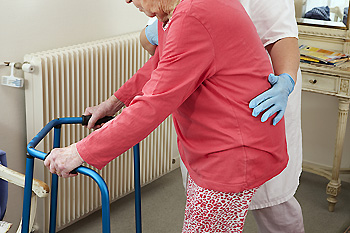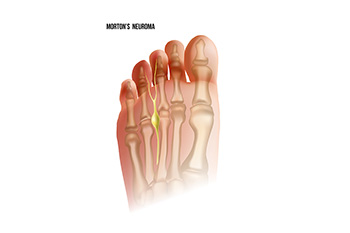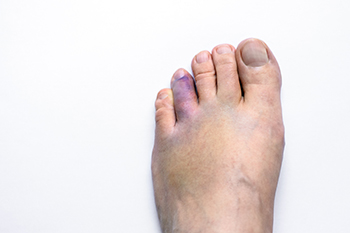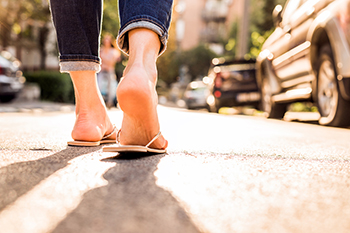March 2023
Preventing Falls in Outdoor Spaces

Sometimes when a senior citizen suffers a fall, it can be due to diminished strength in the feet. The fall can, in turn, further negatively affect the health of the senior’s feet. Many falls commonly take place in outdoor spaces. There are several things that a senior citizen might consider implementing to prevent falls from taking place in outdoor spaces. For example, a senior can ensure that their front steps or steps to a patio are even and not broken or loose. Additionally, a senior can be sure to turn on outdoor lighting fixtures after dark when going on the porch or patio to increase visibility. Lastly, during the winter, a senior might even consider using ice melt products in certain outdoor areas to combat slippery ice. If you are a senior citizen, or are caring for one, it is highly recommended that you reach out to a podiatrist for an appointment to learn more about fall prevention.
Preventing falls among the elderly is very important. If you are older and have fallen or fear that you are prone to falling, consult with Dr. Lee R. Stein from Lake Shore Foot & Ankle, PC. Our doctor will assess your condition and provide you with quality advice and care.
Every 11 seconds, an elderly American is being treated in an emergency room for a fall related injury. Falls are the leading cause of head and hip injuries for those 65 and older. Due to decreases in strength, balance, senses, and lack of awareness, elderly persons are very susceptible to falling. Thankfully, there are a number of things older persons can do to prevent falls.
How to Prevent Falls
Some effective methods that older persons can do to prevent falls include:
- Enrolling in strength and balance exercise program to increase balance and strength
- Periodically having your sight and hearing checked
- Discuss any medications you have with a doctor to see if it increases the risk of falling
- Clearing the house of falling hazards and installing devices like grab bars and railings
- Utilizing a walker or cane
- Wearing shoes that provide good support and cushioning
- Talking to family members about falling and increasing awareness
Falling can be a traumatic and embarrassing experience for elderly persons; this can make them less willing to leave the house, and less willing to talk to someone about their fears of falling. Doing such things, however, will increase the likelihood of tripping or losing one’s balance. Knowing the causes of falling and how to prevent them is the best way to mitigate the risk of serious injury.
If you have any questions, please feel free to contact one of our offices located in Chicago, Highland Park, and Uptown, IL . We offer the newest diagnostic and treatment technologies for all your foot care needs.
Morton’s Neuroma and High Heels

Morton’s neuroma is a foot condition that causes pain between the third and fourth toes. It affects the nerve in this area of the foot, and it may become enlarged and irritated. This can happen from wearing shoes that do not have enough room in the toe area to freely move in. High heels fit into this category, and can cause the toes to become cramped. Some of the symptoms that are felt with this condition can include a sensation that is likened to stepping on a marble or small pebble, and the area can feel like it is burning or numb. Relief may be found when appropriate shoes are worn, and it is beneficial to refrain from wearing high heels. The sooner the relief is found, the more of a chance a treatment method will be successful. This may include wearing orthotics that can support the shape of the foot, which may ultimately help in reducing existing irritation from the nerve. If you feel you may have Morton’s neuroma, it is suggested that you speak with a podiatrist who can confirm the diagnosis and offer effective treatment options.
Morton’s neuroma is a very uncomfortable condition to live with. If you think you have Morton’s neuroma, contact Dr. Lee R. Stein of Lake Shore Foot & Ankle, PC. Our doctor will attend to all of your foot care needs and answer any of your related questions.
Morton’s Neuroma
Morton's neuroma is a painful foot condition that commonly affects the areas between the second and third or third and fourth toe, although other areas of the foot are also susceptible. Morton’s neuroma is caused by an inflamed nerve in the foot that is being squeezed and aggravated by surrounding bones.
What Increases the Chances of Having Morton’s Neuroma?
- Ill-fitting high heels or shoes that add pressure to the toe or foot
- Jogging, running or any sport that involves constant impact to the foot
- Flat feet, bunions, and any other foot deformities
Morton’s neuroma is a very treatable condition. Orthotics and shoe inserts can often be used to alleviate the pain on the forefront of the feet. In more severe cases, corticosteroids can also be prescribed. In order to figure out the best treatment for your neuroma, it’s recommended to seek the care of a podiatrist who can diagnose your condition and provide different treatment options.
If you have any questions, please feel free to contact one of our offices located in Chicago, Highland Park, and Uptown, IL . We offer the newest diagnostic and treatment technologies for all your foot care needs.
Is My Toe Broken?

A broken toe is a common foot injury. It can happen because of a heavy object falling on it, or if it is stubbed on a piece of furniture. Broken toes are often accompanied by immediate bruising, and it may be difficult to walk. A broken toe is considered severe if the bone is protruding through the skin, and prompt medical attention should be sought. A diagnosis may consist of having an X-ray taken. Some broken toes can be treated by using the buddy taping method. This is when the broken toe is taped to the toe next to it for stability. The recovery time for a broken toe to heal can take up to six weeks. If you have fractured any of your toes, it is suggested that you speak with a podiatrist for proper diagnosis and treatment.
Broken toes may cause a lot of pain and should be treated as soon as possible. If you have any concerns about your feet, contact Dr. Lee R. Stein from Lake Shore Foot & Ankle, PC. Our doctor will treat your foot and ankle needs.
What Is a Broken Toe?
A broken toe occurs when one or more of the toe bones of the foot are broken after an injury. Injuries such as stubbing your toe or dropping a heavy object on it may cause a toe fracture.
Symptoms of a Broken Toe
- Swelling
- Pain (with/without wearing shoes)
- Stiffness
- Nail Injury
Although the injured toe should be monitored daily, it is especially important to have a podiatrist look at your toe if you have severe symptoms. Some of these symptoms include worsening or new pain that is not relieved with medication, sores, redness, or open wounds near the toe.
If you have any questions, please feel free to contact one of our offices located in Chicago, Highland Park, and Uptown, IL . We offer the newest diagnostic and treatment technologies for all your foot care needs.
Foot Problems From Wearing Flip-Flops

Flip-flops may be cute, easy, and inexpensive additions to a summer wardrobe, but they can cause problems for your feet and body. This type of footwear usually does not cushion the feet from impact when walking, particularly on harder surfaces like asphalt, and can cause foot and leg pain. Because they leave the feet exposed, one is susceptible to bites, infections, and injuries when wearing them. Also, since these shoes have a flat form, wearing them can lead to gait problems. They do not give stability to the feet or stay on the feet well and can result in muscle pain throughout the body. If you have additional questions about the effects of wearing flip-flops, it is suggested that you consult with a podiatrist for an expert opinion.
Flip-flops are not always the best choice of footwear. If you have any concerns about your feet or ankles, contact Dr. Lee R. Stein from Lake Shore Foot & Ankle, PC. Our doctor will assist you with all of your foot and ankle needs.
Flip-Flops and Feet
When the weather starts warming up, people enjoy wearing flip-flops. Flip-flops are comfortable, stylish, and easy to slip on and off; they're perfect for any summer beach goer. However, these shoes can cause harm to the feet.
How Can Flip-Flops Affect Me Long-Term?
- Ankle problems
- Hip problems
- Lower back problems
- Pain in the balls of the feet
- Problems with foot arches
- Changes in the way you walk
Are There Injuries Associated with Flip-Flops?
Yes. Since flip-flops are relatively weak and do not provide the same amount of support as sneakers, people who wear flip-flops regularly are more susceptible to injuries. On top of that, the open nature of the shoe makes your feet more prone to other problems, such as cuts and even infections. Common injuries and ailments include:
- Sprained ankles
- Blisters
- Infections
- Cuts and Scrapes
I like Wearing Flip-Flops. Are There Safe Alternatives?
When buying flip-flops, try to find ones that have sturdy soles and that are made of high-quality materials that will support for your feet. These flip-flops will cost more but will also last longer as a result.
If you have any questions please feel free to contact one of our offices located in Chicago, Highland Park, and Uptown, IL . We offer the newest diagnostic and treatment technologies for all your foot and ankle needs.
Gout Pain Can Be Managed
Blog Archives
- April 2025
- March 2025
- February 2025
- January 2025
- December 2024
- November 2024
- October 2024
- September 2024
- August 2024
- July 2024
- June 2024
- May 2024
- April 2024
- March 2024
- February 2024
- January 2024
- December 2023
- November 2023
- October 2023
- September 2023
- August 2023
- July 2023
- June 2023
- May 2023
- April 2023
- March 2023
- February 2023
- January 2023
- December 2022
- November 2022
- October 2022
- September 2022
- August 2022
- July 2022
- June 2022
- May 2022
- April 2022
- March 2022
- February 2022
- January 2022
- December 2021
- November 2021
- October 2021
- September 2021
- August 2021
- July 2021
- June 2021
- May 2021
- April 2021
- March 2021
- February 2021
- January 2021
- December 2020
- November 2020
- October 2020
- September 2020
- August 2020
- July 2020
- June 2020
- May 2020
- April 2020
- March 2020
- February 2020
- January 2020
- December 2019
- November 2019
- October 2019
- September 2019
- August 2019
- July 2019
- June 2019
- May 2019
- April 2019
- March 2019
- February 2019
- January 2019
- December 2018
- November 2018
- October 2018
- September 2018
- August 2018
- July 2018








